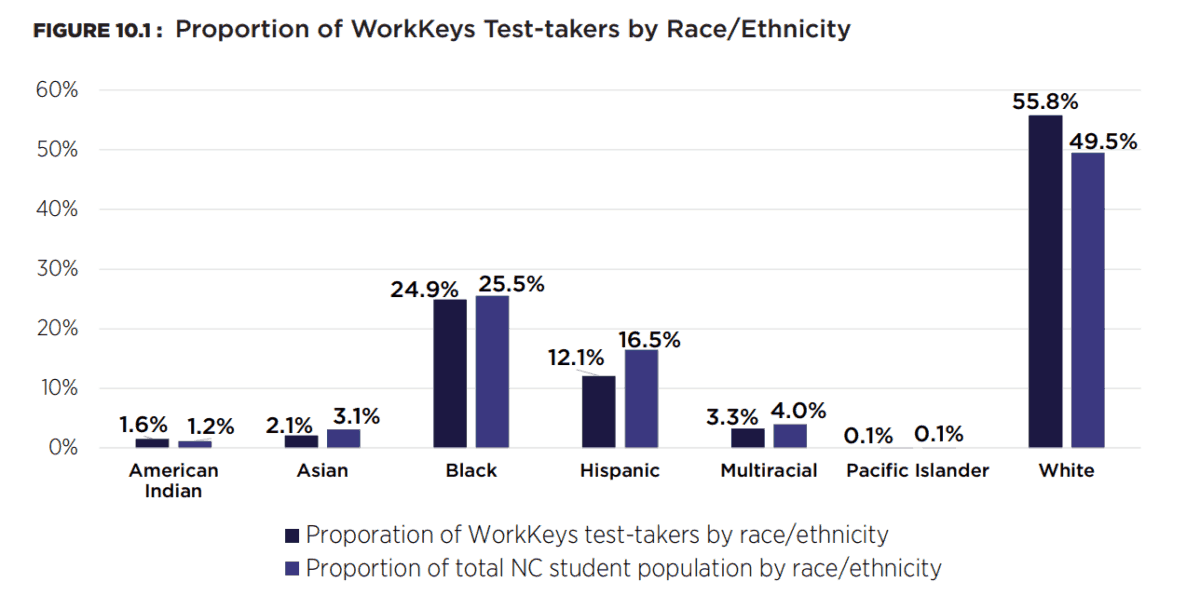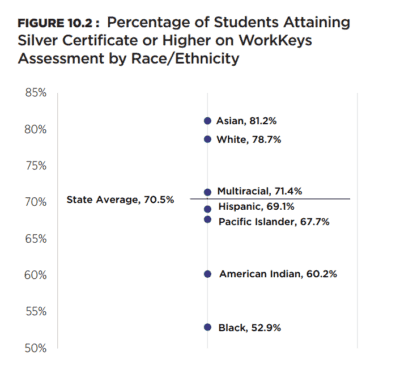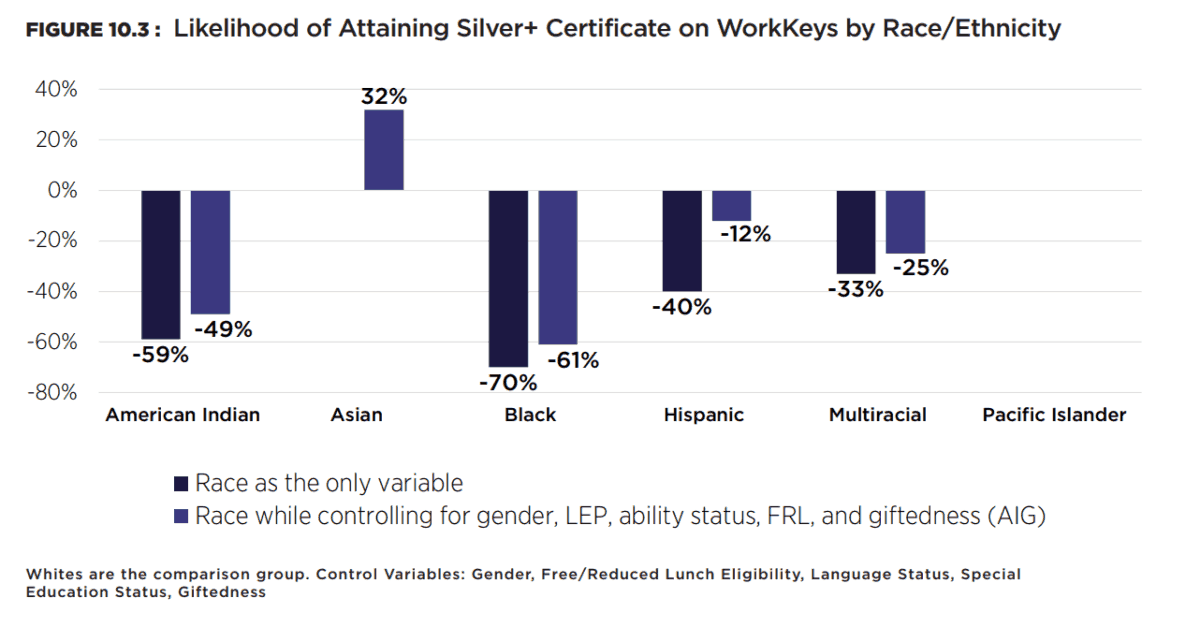This is an excerpt from “E(race)ing Inequities: The State of Racial Equity in North Carolina Public Schools” by the Center for Racial Equity in Education (CREED). Go here to read the full report and to find all content related to the report, including the companion report Deep Rooted.![]()
WorkKeys is an alternative ACT test that is intended for high school students who plan to pursue career and technical diplomas. According to ACT, WorkKeys scores are intended to help students and employers compare potential employees on necessary skills (ACT, 2018). Over 23,000 employers, including over 3600 in North Carolina, recognize and/or recommend a WorkKeys National Career Readiness Certificate as a measure of foundational workplace skills (ACT, 2019).
WorkKeys measures applied mathematics, locating information, and reading for information. Students earn tiered certificates: Platinum, Gold, Silver, Bronze, and No Certificate. According to ACT, Inc., a Gold certificate indicates that a student possesses skills for approximately 85% of jobs that have been profiled by WorkKeys, a Silver certificate indicates that a student possesses skills for approximately 65% of jobs that have been profiled by WorkKeys, and Bronze indicates that a student possesses skills for approximately 30% of jobs that have been profiled by WorkKeys.
In 2012-13, WorkKeys became part of North Carolina’s school accountability program. The state administers the ACT WorkKeys assessment to all students pursuing a Career and Technical Education (CTE) diploma who complete CTE course sequence prior to graduation. The NC Department of Public Instruction positions WorkKeys as a gauge of career readiness and is widely recognized as an industry credential (http://www.dpi.state.nc.us/cte/directory/). As part of the CTE program, state and local educational agencies maintain partnerships with business and industry as a means of providing students with clear pathways to jobs in their chosen career.1
Analysis
Approximately 44,000 students took the WorkKeys assessment in North Carolina in 2016-2017. Figure 10.1 shows the proportion of WorkKeys test-takers and the proportion of total North Carolina student population by racial/ethnic group.

White and American Indian students took WorkKeys at higher rates than their proportion of all North Carolina students. Asian, Black, Hispanic, and Multiracial students took WorkKeys at lower rates. The difference between the proportion of WorkKeys participation and proportion of total student population is highest for White students.
Figure 10.2 shows the percentage of students attaining a Silver certificate or higher by race/ethnicity. See Appendix A, Table 6 for data on all WorkKeys certificate levels.

Approximately 71% of students who took the WorkKeys assessment received at least a Silver certificate (Silver+). Asian and White students attain Silver+ certificates at the highest rates, followed by Multiracial, Hispanic, and Pacific Islander students. American Indian and Black students are least likely to attain Silver+ certificates. If Black students had achieved at the state average for WorkKeys, approximately 2000 more Black students would have attained Silver+ certificates.
We also built statistical models to predict the likelihood of attaining Silver+ while controlling for other potentially relevant factors. In Model 1, scores were predicted based on race/ethnicity alone. Model 2 controlled for gender, socioeconomic status, language status, special education status, and previous achievement. White students were the comparison group for all other racial/ethnic groups.

Race/ethnicity remained a significant and substantial predictor of attaining a Silver+ WorkKeys certificate for all student groups of color after accounting for other factors, except in the case of Pacific Islanders. The largest racial disparity existed between Black and White students, such that Black students were 61% less likely than White students to attain a Silver+ certificate net of other factors. Furthermore, the effect of being Black was approximately twice that of free/reduced lunch eligibility. Giftedness was the strongest predictor overall, such that AIG students are 8.3 times more likely to attain a Silver+ certificate than their non-AIG counterparts after controlling for race/ethnicity, gender, SES, language, and special education status.
Takeaways
With the exception of Hispanic students, race/ethnicity does not appear to exert a strong influence on which students take the WorkKeys assessment. However, there are substantial racial disparities in WorkKeys performance, with Asian and White students scoring well above the state average and American Indian and Black students scoring far below the state average. Furthermore, in comparison to White students, American Indian, Black, and Multiracial students were predicted to have dramatically lower rates of Silver+ certificate attainment after controlling for potentially relevant factors.
The observed racial disparities in WorkKeys performance suggest that among students working toward CTE diplomas, non-Asian students of color, particularly American Indian and Black students, are over-exposed to the risk of graduating without the necessary skills to transition into jobs across numerous career pathways. When viewed in concert with our analysis of ACT scores, our analysis of WorkKeys further suggests that non-Asian students of color are at increased risk of failing to meet the state’s explicitly stated goal of college and career readiness for all students.
References
ACT. (2018). How the ACT® WORKKEYS® ASSESSMENTS can work for you. Iowa City, IA: ACT. Retrieved from https://www.act.org/content/dam/act/unsecured/documents/How-WorkKeys-Assessment-Can-Work-For-You-Brochure.pdf
ACT. (2019). ACT work ready communities, North Carolina. Retrieved from https://www.workreadycommunities.org/national/businesses/?business_name=&state_id=33&county_id=&num_employees=&type=
Editor’s note: James Ford is on contract with the N.C. Center for Public Policy Research from 2017-2020 while he leads this statewide study of equity in our schools. Center staff is supporting Ford’s leadership of the study, conducted an independent verification of the data, and edited the reports.




